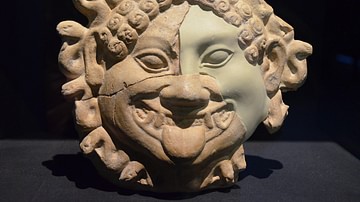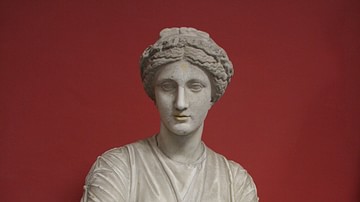Search
Remove Ads
Advertisement
Summary 
Loading AI-generated summary based on World History Encyclopedia articles ...
Search Results

Definition
Greek Mythology
Greek mythology was used as a means to explain the environment in which humankind lived, the natural phenomena they witnessed and the passing of time through the days, months, and seasons. Greek myths were also intricately connected to religion...

Article
A Visual Who's Who of Greek Mythology
Achilles The hero of the Trojan War, leader of the Myrmidons, slayer of Hector and Greece's greatest warrior, who sadly came unstuck when Paris sent a flying arrow guided by Apollo, which caught him in his only weak spot, his heel. Adonis...

Image Gallery
A Gallery of Monsters and Creatures of Greek Mythology
The myths and legends of ancient Greece included a wide variety of fearsome creatures and monsters, such as dragons, giants, demons, and multiformed beings like the sphinx, minotaur, centaurs, and griffins. These terrifying entities often...

Article
Hesiod on the Birth of the Gods
The Greek poet Hesiod (c. 700 BCE) is most famous for his works Theogony and Works and Days. In this passage from Theogony, Hesiod relates the birth of the gods from cosmic Chaos and follows the lineage through the great Zeus, King of the...

Video
Greek Mythology Family Tree: Primordials, Titans & Olympians
A guide to the genealogy of Greek gods and goddesses. CREDITS: Chart: Matt Baker Script/Narration: Matt Baker Animation: Syawish Rehman Audio Editing: Jack Rackham Intro music: "Lord of the Land" by Kevin MacLeod and licensed under...

Image
The Nine Muses of Greek Mythology
An infographic depicting the nine Muses of Greek mythology. The Muses are a group of divine sisters who govern various aspects of creativity and intellectual pursuits. Originally, the ancient Greeks recognized three Muses: Melete, Mneme...

Video
The 12 Olympians: The Gods and Goddesses of Ancient Greek Mythology
The 12 Olympians were the 12 most important gods and goddesses of Ancient Greek Mythology, and were so-called because it was believed they dwelt on Mount Olympus. Our Olympians Gods and Goddesses are Zeus, Hera, Poseidon, Demeter, Ares, Athena...

Video
Hades, Tartarus and the Underworld in Greek Mythology
The Greek God Hades was born to the Titans Rhea and Cronus, and along with his siblings Hestia, Demeter, Hera and Poseidon, they were swallowed by their father (except Zeus). After the battle known as the Titanomachy, the Olympian gods were...

Video
Greek Goddess Artemis: Goddess of the Hunt and the Moon in Greek Mythology
The Greek goddess Artemis was the goddess of the hunt, wild nature and the moon in Greek mythology. She was the daughter of Leto and Zeus, and the twin sister to Apollo, the god of the sun, medicine and music among others. Artemis was a patron...

Definition
Odysseus
Odysseus (Roman name: Ulysses) was one of the great pan-Hellenic heroes of Greek mythology. He was famous for his courage, intelligence, and leadership. Odysseus' resourcefulness and oratory skills were instrumental in the Greek victory in...